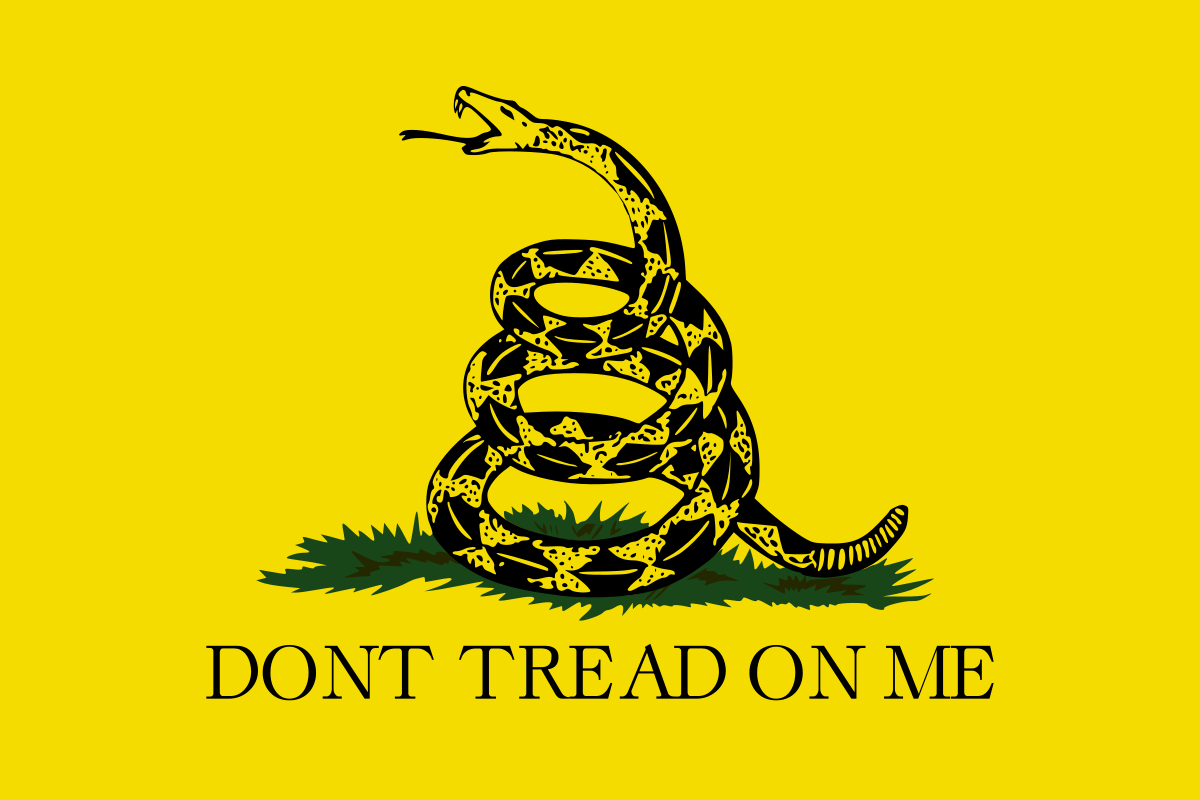(Created page with "thumb|The Gadsden Flag is commonly used by Libertarians and others on the Hard-Right. '''Libertarianism''', or in this context, '''Right-Wing Libertarianism''', refers to the ultra-indivdualist and hightly idealistic ideologies that view the government as the primary force that reduces their "liberty", and view capitalism<ref group="Note">That is, their own utopian view of what "capitalism" is, as many will rej...") Tag: Visual edit |
mNo edit summary Tag: Visual edit |
||
| Line 1: | Line 1: | ||
[[File:Gadsden flag.png|thumb|The Gadsden Flag is commonly used by Libertarians and others on the Hard-Right.]] | [[File:Gadsden flag.png|thumb|The Gadsden Flag is commonly used by Libertarians and others on the Hard-Right.]] | ||
'''Libertarianism''', or in this context, '''Right-Wing Libertarianism''', refers to the [[Individualism|ultra-indivdualist]] and hightly [[Idealism|idealistic]] ideologies that view the government as the primary force that reduces their "liberty", and view [[capitalism]] | '''Libertarianism''', or in this context, '''Right-Wing Libertarianism''', refers to the [[Individualism|ultra-indivdualist]] and hightly [[Idealism|idealistic]] ideologies that view the government as the primary force that reduces their "liberty", and view [[capitalism]] as a largely voluntary and effective system. Similar to [[Liberalism|Liberals]], Libertarians put a large amount of stock in the ideas of "natural law", but unlike Liberals, Libertarians take "nautral law", as well as indivdualism, to a much more extreme conclusion, to the point where many of them are willing to deprive the poor and needful of basic social programs all in the goal of creating an idealistic "[[Free market|free-market]]" utopia.<ref>{{News citation|author=David Boaz|newspaper=Encyclopædia Britannica|title=Libertarianism|date=2015-5-4|url=https://www.britannica.com/topic/libertarianism-politics/Historical-origins}}</ref><ref>{{News citation|author=Murray N. Rothbard|newspaper=Mises Institute|title=The Left and Right within Libertarianism|date=2010-12-21|url=https://mises.org/library/left-and-right-within-libertarianism|retrieved=2022-6-11}}</ref><ref>{{News citation|author=David Boaz|newspaper=Cato Institute|title=Key Concepts of Libertarianism|date=2019-4-19|url=https://www.cato.org/commentary/key-concepts-libertarianism}}</ref> | ||
Right-Wing Libertarians can be broadly split into three groups - Mainstream Libertarians (those who make up the majority of the movement, and whom are the least extreme), Minarchists (those who want a "minimal state"), and Anarcho-Capitalists (who are the most idealistic and extreme).<ref>{{Citation|author=Randy E. Barnett|year=1998|title=The Structure of Liberty|page=1|pdf=https://www.cato.org/sites/cato.org/files/serials/files/cato-journal/2000/11/cj20n2-8.pdf|city=New York|publisher=Oxford University Press|volume=20|trans-lang=English}}</ref> Futhermore, while Libertarians are some of the most fanatical apologists of capitalism, they are often times rather progressive on certain social issues, such as drug prohibition, firearm ownership, and mass incarceration of the poor.<ref>{{News citation|author=David Boaz, David Kirby|newspaper=Cato Institute|title=The Libertarian Vote|date=2006-10-18|url=https://www.cato.org/policy-analysis/libertarian-vote}}</ref> | Right-Wing Libertarians can be broadly split into three groups - Mainstream Libertarians (those who make up the majority of the movement, and whom are the least extreme), Minarchists (those who want a "minimal state"), and [[Anarcho-Capitalism|Anarcho-Capitalists]] (who are the most idealistic and extreme).<ref>{{Citation|author=Randy E. Barnett|year=1998|title=The Structure of Liberty|page=1|pdf=https://www.cato.org/sites/cato.org/files/serials/files/cato-journal/2000/11/cj20n2-8.pdf|city=New York|publisher=Oxford University Press|volume=20|trans-lang=English}}</ref> Futhermore, while Libertarians are some of the most fanatical apologists of capitalism, they are often times rather progressive on certain social issues, such as drug prohibition, firearm ownership, and mass incarceration of the poor.<ref>{{News citation|author=David Boaz, David Kirby|newspaper=Cato Institute|title=The Libertarian Vote|date=2006-10-18|url=https://www.cato.org/policy-analysis/libertarian-vote}}</ref> | ||
In spite of Libertarianism being, in theory, an anti-state ideology, Libertarians often have a trend of embracing [[Racism|white-supremacist]] ideas, and otherwise [[Fascist]] ideology. This trend is known as the ''Alt-Right Pipeline''.<ref>{{Citation|author=Munn, L.|year=2019|title=Alt-right pipeline: Individual journeys to extremism online|title-url=https://www.researchgate.net/publication/333639104_Alt-right_pipeline_Individual_journeys_to_extremism_online|doi=https://doi.org/10.5210/fm.v24i6.10108|volume=24|trans-lang=English}}</ref> | In spite of Libertarianism being, in theory, an anti-state ideology, Libertarians often have a trend of embracing [[Racism|white-supremacist]] ideas, and otherwise [[Fascist]] ideology. This trend is known as the ''Alt-Right Pipeline''.<ref>{{Citation|author=Munn, L.|year=2019|title=Alt-right pipeline: Individual journeys to extremism online|title-url=https://www.researchgate.net/publication/333639104_Alt-right_pipeline_Individual_journeys_to_extremism_online|doi=https://doi.org/10.5210/fm.v24i6.10108|volume=24|trans-lang=English}}</ref> | ||
Revision as of 23:59, 11 June 2022

Libertarianism, or in this context, Right-Wing Libertarianism, refers to the ultra-indivdualist and hightly idealistic ideologies that view the government as the primary force that reduces their "liberty", and view capitalism as a largely voluntary and effective system. Similar to Liberals, Libertarians put a large amount of stock in the ideas of "natural law", but unlike Liberals, Libertarians take "nautral law", as well as indivdualism, to a much more extreme conclusion, to the point where many of them are willing to deprive the poor and needful of basic social programs all in the goal of creating an idealistic "free-market" utopia.[1][2][3]
Right-Wing Libertarians can be broadly split into three groups - Mainstream Libertarians (those who make up the majority of the movement, and whom are the least extreme), Minarchists (those who want a "minimal state"), and Anarcho-Capitalists (who are the most idealistic and extreme).[4] Futhermore, while Libertarians are some of the most fanatical apologists of capitalism, they are often times rather progressive on certain social issues, such as drug prohibition, firearm ownership, and mass incarceration of the poor.[5]
In spite of Libertarianism being, in theory, an anti-state ideology, Libertarians often have a trend of embracing white-supremacist ideas, and otherwise Fascist ideology. This trend is known as the Alt-Right Pipeline.[6]
References
- ↑ David Boaz (2015-5-4). "Libertarianism" Encyclopædia Britannica.
- ↑ Murray N. Rothbard (2010-12-21). "The Left and Right within Libertarianism" Mises Institute. Retrieved 2022-6-11.
- ↑ David Boaz (2019-4-19). "Key Concepts of Libertarianism" Cato Institute.
- ↑ Randy E. Barnett (1998). The Structure of Liberty, vol. 20. [PDF] New York: Oxford University Press.
- ↑ David Boaz, David Kirby (2006-10-18). "The Libertarian Vote" Cato Institute.
- ↑ Munn, L. (2019). Alt-right pipeline: Individual journeys to extremism online, vol. 24. doi: https://doi.org/10.5210/fm.v24i6.10108 [HUB]